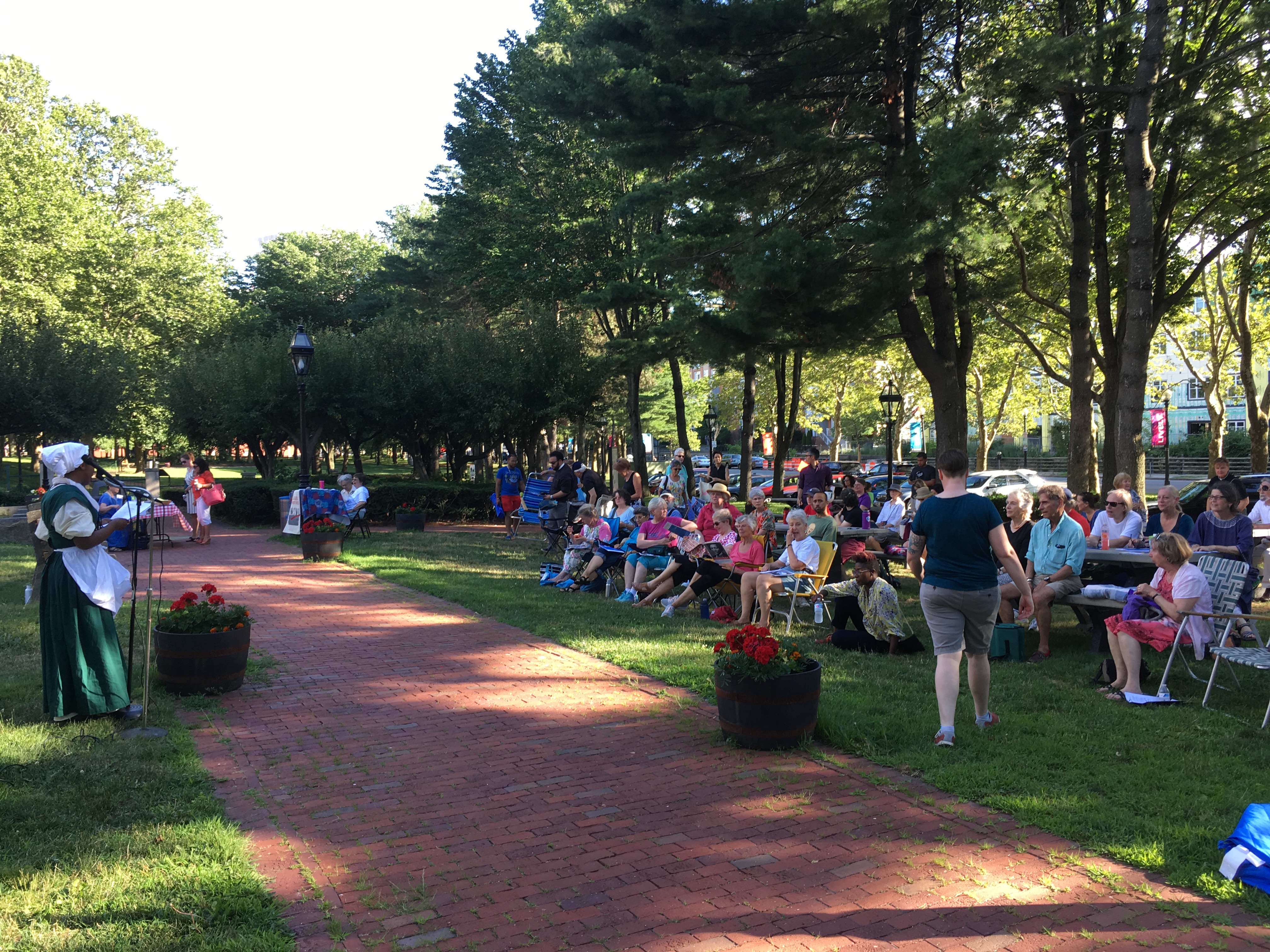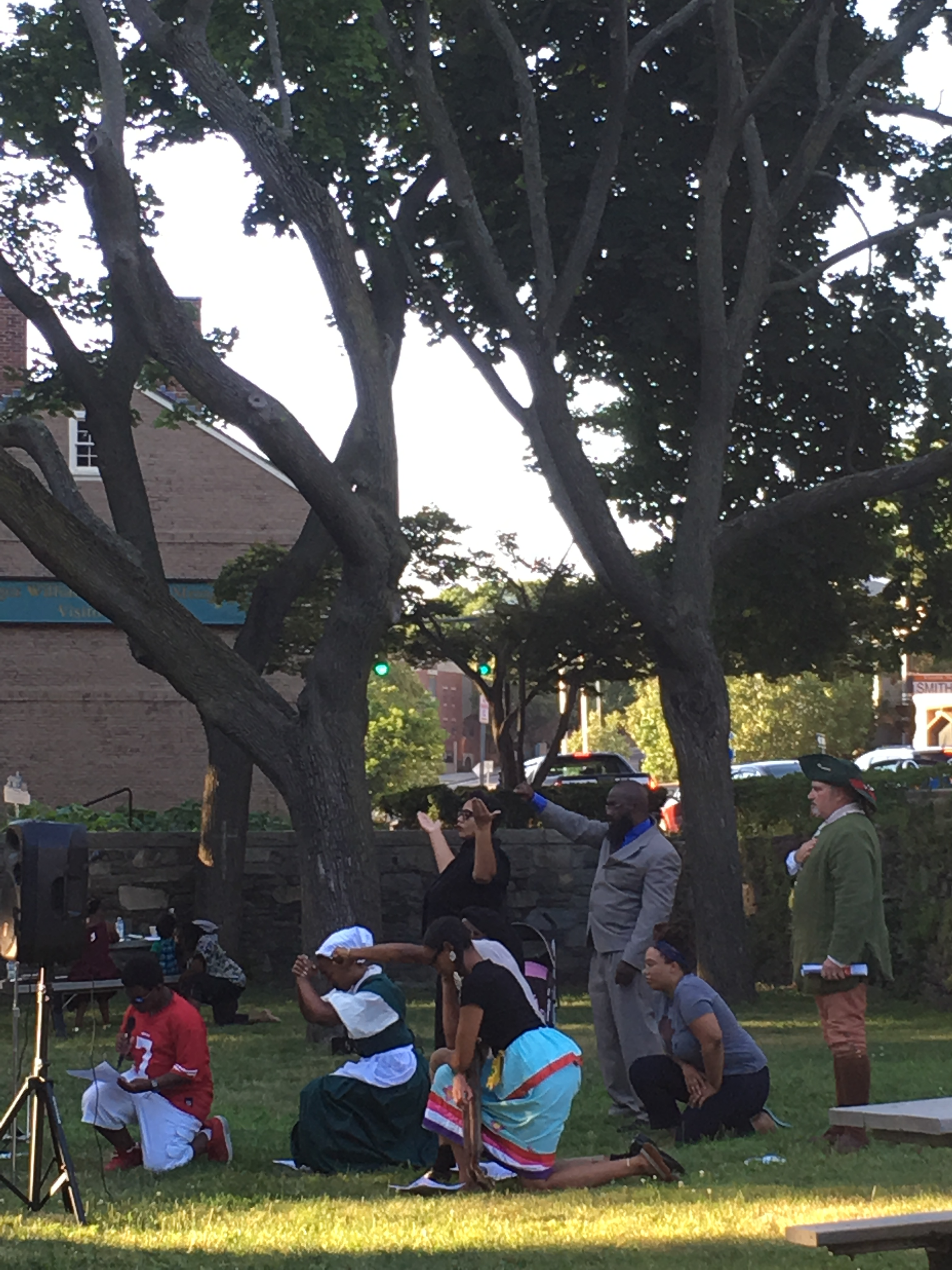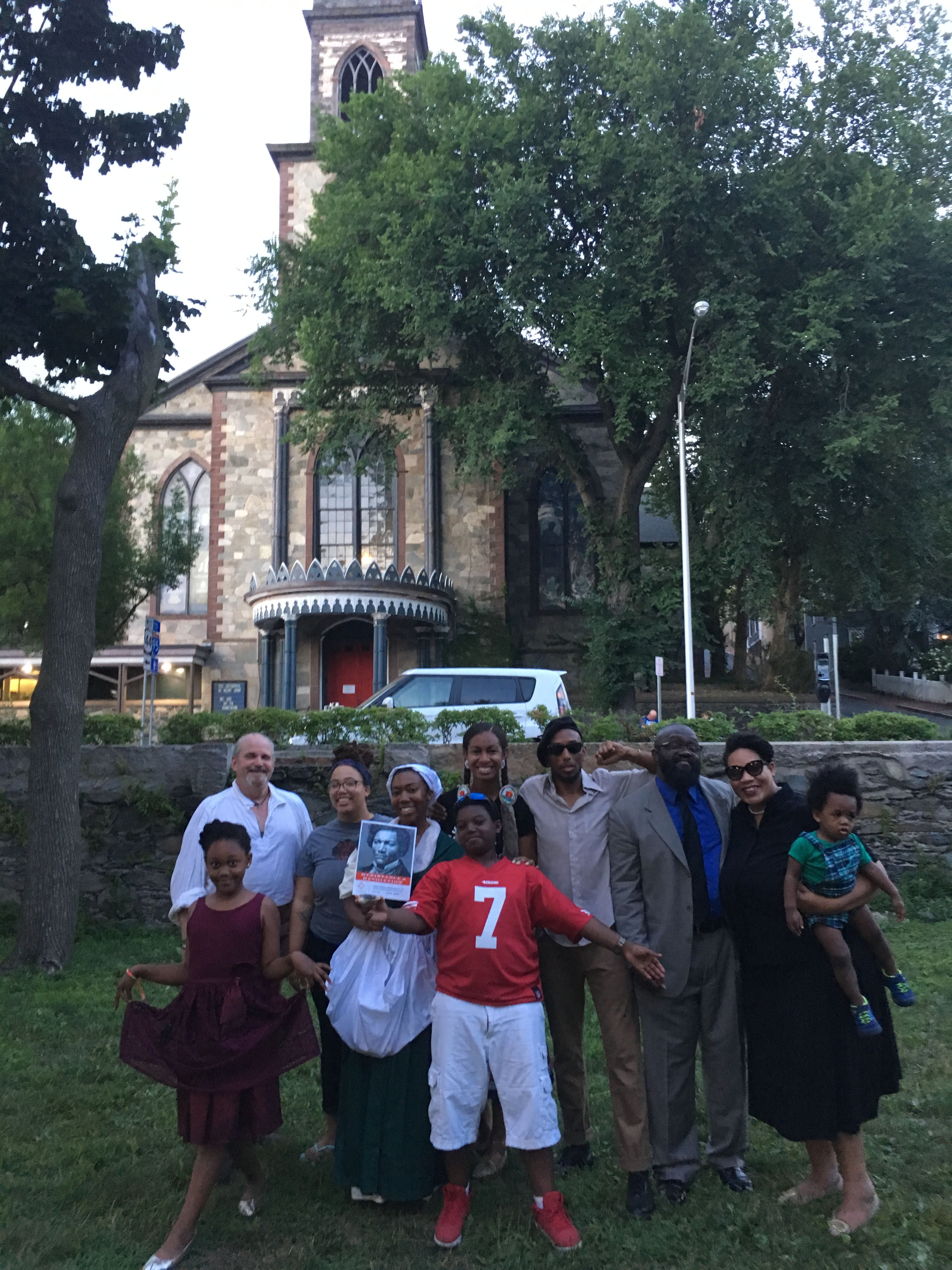The Reverend Dante Tavolaro, Curate at St. Luke’s Episcopal Church in East Greenwich, attended our program Resistance and Revolution on July 5, 2018, and was kind enough to share his reflections with us. This piece was originally published in the St. Luke’s [East Greenwich] Weekly on July 6, 2018.
Following the piece below by Rev. Tavolaro, we have included a response from Terrlyn L. Curry Avery, Ph.D., MDiv.
On the evening of July 5, 85 people gathered at Roger Williams National Memorial (the park across the street from the Cathedral of St. John) to listen to a dramatic reading of the Declaration of Independence, a community reading of Frederick Douglass’s “What to the Slave is the Fourth of July?” and the singing of all four verses of the “Star Spangled Banner.” As I sat in the park listening, watching and praying, I found myself overcome with emotions as each performance was more powerful than the last.


To hear those words of the Declaration of Independence come alive off the page was powerful. What was more striking to me was the fact that those words were largely read by a staff member of the Roger Williams National Memorial dressed as a colonist (white man), as the rest of the dramatic readers read portions and highlighted particular words or phrases. It was a powerful reminder that “all men” has not always meant all throughout our nation’s complicated and sometimes difficult history. It is worth noting that standing with the colonist were several actors of color representing the civil rights movement, the black power movement, a slave woman and others. I found myself challenged by this image, and it gave me pause to reflect on the words I was hearing.

But the emotional journey was not over yet. After the reading of the Declaration of Independence, those gathered were invited to share in a community reading of Frederick Douglass’s “What to the Slave is the Fourth of July?” This was a speech delivered by Douglass on July 5, 1852. When I arrived at the park I was given a printed copy, and as I waited for the event to start I read several of the paragraphs. I was moved by the words. But hearing these words spoken by the character actors and by community members made the words come to life. Regularly throughout this reading I was moved to tears as I found my own actions called up short. I found myself in tears as I reflected on the fact that the day before – July 4 – I participated in celebrating our national holiday and the holy day (that’s right, the Fourth of July is a holy day on our church’s calendar). Just 24 hours earlier I was reflecting on how to bridge the gap between national holiday and holy day, reflecting on how to live in the tension of our dual citizenship of the kingdom of God and the United States. I thought I had it figured out until I heard these words about halfway through the reading:
What, to the American slave, is your 4th of July? I answer: a day that reveals to him, more than all other days in the year, the gross injustice and cruelty to which he is the constant victim. To him, your celebration is a sham; your boasted liberty, an unholy license; your national greatness, swelling vanity; your sounds of rejoicing are empty and heartless, hollow mockery; your prayers and hymns, your sermons and thanksgivings, with all your religious parade, and solemnity, are, to him, mere bombast, fraud, deception, impiety, and hypocrisy – a thin veil to cover up crimes which would disgrace a nation of savages.
The tears flowed.
For the next day, I was not able to escape reliving and reflecting on this experience, and I do not think that is a bad thing. It made me wonder what other groups we might substitute for “slave” in those words. It made me wonder: What to the black man, the American immigrant, the gay, lesbian, bisexual, transgender and queer person, the homeless veteran, the societal outcast is the Fourth of July? It made me wonder what groups are still not fully included in our national life? Which groups are still struggling to break free from the shackles of oppression? It made me wonder how much more work there is for us to do as followers of Jesus to ensure the true freedom and liberation of all of God’s beloved children.
At the conclusion of the performances, a young boy dressed as football player Colin Kaepernick sang all four verses of the “Star Spangled Banner.” Before he began to sing, the gathered community was invited to take whatever posture they felt most comfortable in. They were invite to kneel, to remain seated or to stand. As the actors took their chosen postures so did the community, and this angelic voice began to sing. As his song echoed through the park I looked around and saw the mixed crowd standing and sitting and kneeling together. As the verses progressed and we got to the final two verses, members of the gathered community began to softly sing along. Chills and tears filled my body. As I thought about how much more work we have to do as Americans and Christians to live into the promises and ideals of our founding documents for all people, that moment, gathered in Roger Williams National Memorial, in the shadow of the cathedral, gave me hope. It gave me hope because there we were a group of mixed identities across lines of race, class, gender, gender identity, sexual orientation, religious affiliation, political association and educational background. It gave me hope because we were a group of mixed postures as the “Star Spangled Banner” filled our souls. It gave me hope because that is what I imagine the kingdom of God to be like: a gathering of all God’s beloved children, a mixed community from across every line of difference, standing, sitting and kneeling together in peace.

May this holiday and holy day inspire us to seek to follow Christ the Prince of Peace, the great liberator, the author of our salvation to build the kingdom of God right here and right now.
Blessings,
Dante
The Rev’d Dante A. Tavolaro
Curate
And where is that band who so vauntingly swore
That the havoc of war and the battle’s confusion
A home and a country should leave us no more!
Their blood has washed out their foul footsteps’ pollution
No refuge could save the hireling and slave
From the terror of flight, or the gloom of the grave,
And the star-spangled banner in triumph doth wave
O’er the land of the free and the home of the brave!
This last paragraph was written by Key in opposition to the Colonial Marines, a group of runaway slaves who joined with the British Royal Army in exchange for their freedom. Here is one article written on the song: https://www.theroot.com /star-spangled-bigotry-the-hid den-racist-history-of-the-1790 855893.
I think the idea of all groups singing and coming together to heal our wounds and understand our differences is a hopeful and encouraging start. I’m just a bit surprised that this bit of history would not have been addressed in such an advocacy minded group.
Thanks for sharing.
Peace, love, and blessings!
Terrlyn L. Curry Avery, Ph.D., MDiv.
